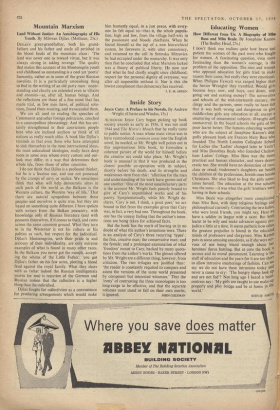Mountain Marxism
DIMAS'S great-grandfather, both his grand- fathers and his father and uncle all perished in the blood feuds of the mountain clans : 'The land was never one to reward virtue, but it was always strong in taking revenge.' The quality that makes this account of his Montenegrin youth and childhood so outstanding is a cool yet 'poetic' humanity, rather as in some of the great Russian novelists. It is a particularly astonishing thing to find in the writing of an old party man : under- standing and charity are extended even to villains and enemies—as, after all, human beings. And the reflections are those of a fine mind that has made trial, as few men have, of political solu- tions, found them wanting, and transcended them.
We are all used to reading the speeches of Communist and other foreign politicians, couched in a cosmopolitan phraseology. And this has cer- tainly strengthened in their convictions people here who are inclined anyhow to think of all nations as really much alike. A book like Djilas's reminds us that even those who have attempted to sink themselves in the most international ideas, the most unlocalised ideologies, really have deep roots in some area whose every custom and out- look may differ, in a way that determines their whole life, from those of other countries.
I do not think that Djilas is a profound thinker, but he is a fearless one, and one not possessed by the cramps of envy or malice. We sometimes think that what will help democratic ideas in such parts of the world as the Balkans is the Western culture, the Western 'way of life.' That there are natural sympathies between these peoples and ourselves is quite true, but they are based on something quite different. I have spoken with writers from the Balkan peasantry, with knowledge only of Russian literature (and with peasants themselves, if it comes to that), and come across the same common ground. What they turn to in the Westerner is not his culture or his politics as such, but respect for the individual.
Djilas's Montenegrins, with their pride in and jealousy of their individuality, are only extreme examples of what is found in many other races.
In the Balkans you never got the moujik, accept- ing the whims of the Little Father : you got Djilas's father on his few acres, plotting a blood feud against the royal family. What they share with us (what indeed the Russian intelligentsia yearns for too) is rejection of the German and Russian notion that the collective is a higher thing than the individual.
Djilas fought for collectivism as a convenience for producing arrangements which would make
him humanly equal, in a just peace, with every- one he felt equal to—that is, the whole popula- tion, high and low, from the village half-wits to the passionate and bloody chieftains. When he found himself at the top of a new hierarchical system, he forswore it, with utter consistency, and returned to the cell in Sremska Mitrovica he had occupied under the monarchy. It was only then that he concluded that what Marxism lacked was a theory of political liberty. He now saw that what he had chiefly sought since childhood, respect for the personal dignity of everyone, was after all impossible without it. Nor is this the lowest compliment that democracy has received.
J. E. M. ARDEN


































 Previous page
Previous page